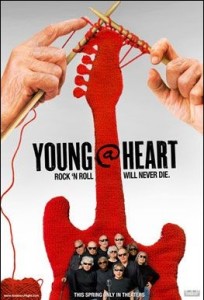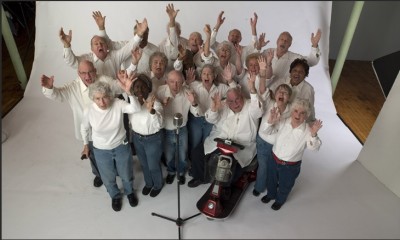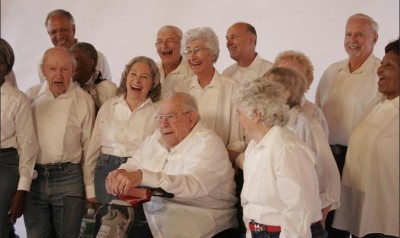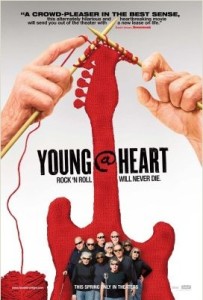By: debbie lynn elias
 For me, anything having to do with screening a film, reviewing it, consulting with filmmakers or even doing my own production work, is a labor of love. But today, with YOUNG @ HEART, writing this review goes even beyond that. I had the privilege of screening YOUNG @ HEART when it premiered last year at the Los Angeles Film Festival. From the opening frame, I knew this was something special. Many of you may have read my raves last year. as I screened it, not once, not twice but three times. And obviously the LAFF audience had the same love affair going with this documentary film as I, for it walked away with an LAFF Audience Award and garnered standing ovations and cheers at each screening and the closing night ceremonies. This film and its subjects, speak to your heart and as you will see for yourselves, comes from the heart and is filled with heart. My respect and admiration for the members of the Young @ Heart chorus is unparalleled but for that which I have for their choral director, Bob Cilman, and the film’s writer/director, Stephen Walker, whom I am privileged to know.
For me, anything having to do with screening a film, reviewing it, consulting with filmmakers or even doing my own production work, is a labor of love. But today, with YOUNG @ HEART, writing this review goes even beyond that. I had the privilege of screening YOUNG @ HEART when it premiered last year at the Los Angeles Film Festival. From the opening frame, I knew this was something special. Many of you may have read my raves last year. as I screened it, not once, not twice but three times. And obviously the LAFF audience had the same love affair going with this documentary film as I, for it walked away with an LAFF Audience Award and garnered standing ovations and cheers at each screening and the closing night ceremonies. This film and its subjects, speak to your heart and as you will see for yourselves, comes from the heart and is filled with heart. My respect and admiration for the members of the Young @ Heart chorus is unparalleled but for that which I have for their choral director, Bob Cilman, and the film’s writer/director, Stephen Walker, whom I am privileged to know.
Many of us have long been consumed with a fear of aging….and to a large degree, rightfully so. For years, the mantra was “don’t trust anyone over 30″, then 40 and 50 became feared and dreaded, “wrinkle” became a watchword and a curse, and by the time one got to be 60 or 70, they were put out to pasture. And let’s not even think about what happens when you are 80 or 90 or even 100+. For me, age was never something I thought about and thanks to blessings of grandparents who were vital and active well into their 90’s (and beyond) and a father who in his 70’s still works more than full-time in broadcast television, activity means longevity and vitality. But that’s not how it is for many who are beyond their golden years and left to their own devices or, put out to pasture. And luckily, for the good folks of Northampton, Massachusetts, they’ve got a friend in Bob Cilman.
Back in 1982, Cilman, a passionate musician and artist, became involved with the Northampton Senior Center and created Young @ Heart, non-profit arts organization and chorus comprised of seniors ranging from 70 to 90+. Drawing on the 30,000 citizens in the area, since 1982 over 100 individuals have been members of the chorus. Thanks to Cilman’s devotion and dedication, seniors that may have floundered or faded are rejuvenated and excited about life and living. They have purpose; they are needed; they are respected and appreciated. And did I say talented!! But what makes this particular chorus of seniors so special? Well, how often do you hear a 90 year old woman sing James Brown’s “I Feel Good” or Allen Toussaint’s “Yes We Can Can” with 78 repetitive “cans”? And what about a senior’s interpretation of the Sonic Youth hit, “Schizophrenia” or a poignant “Should I Stay or Should I Go?” This is the essence of Young @ Heart and it is a brief month long chapter taken from the lives of its members that is the foundation of the film YOUNG @ HEART. And while only a mere chapter, the film speaks volumes.
A 25 year work in progress, the chorus has gained international notariety, touring Europe and appearing before packed theaters and thunderous applause. It was to one such show that documentarian Stephen Walker was “drug” by his wife to see “a group of old people singing rock ‘n roll music…embarrassing karaoke type stuff.” (Of course when you see the film or hear the chorus, you quickly realize, it’s not karaoke at all, but Bob Cilman’s exquisite reinterpretation of those songs.) As Walker describes it, “The audience was completely packed and it was every age group. All ages. More young than older. A lot of people in their 20’s and 30’s. It was a low key opening. They came on carrying walkers; an older man stood by the upright piano and sang a Cole Porter style number. I wasn’t even sure the show had started. Then suddenly the lights dimmed, the entire chorus stood up and they started singing the Talking Heads song, ‘Road to Nowhere’ and I was blown away. And then very quickly Eileen Hall, the 93 year old, comes up to the microphone and does what she does in the film and sings The Clash. And it’s a shock value. But instantly it became the obvious. ‘Should I Stay or Should I Go’ was not a song about relationships when it’s sung by a 93 year old. It’s a song about life and death.” It was in that moment that Walker knew what he had to do. He had to bring Young @ Heart to the big screen – and now – to the world. “We were revved up. We were thinking, actually nobody does a film about old age and export all those taboos and talk about sex and sickness and death and all those things and do it through music, music that people can identify with, struck us as being a really fresh and original thing to do.”
Getting Bob Cilman to agree to Walker’s concept was another matter. Protective of the chorus, it took some six months before he came around to Walker’s way of thinking, although Cilman’s main thrust was and remains that the music is interesting whereas Walker concentrates on several of the chorus members and deems people to be the interest and focus. Cilman was also concerned about the sound and deferring to his knowledge and expertise, Walker recorded in 24 track “really making it sound good so the chorus would sound good.” And so, Stephen Walker and crew crossed the Pond and spent two months shooting the chorus at practice, performance and play, combining interviews with the more outgoing and celebrated members like Eileen Hall, Dora Morrow, Stanley Goldman, Joe Benoit, Fred Knittle, Bob Salvini and Steve Martin, with the groups patented musical stylings amidst life, love and sadly, death. This group has the most individual and collective indominable spirit. Energetic, determined, zealous, inspirational and uplifting, you will embrace each member with your heart as you watch and listen to their stories. Personally, talking with Dora, Stan and Steve was an experience I will cherish throughout my life.
What Cilman and the group are doing with these songs is extraordinary. They give totally new meaning to songs well familiar to most of us. When Lenny Fontaine sings about “Purple Haze”, it’s no longer about drugs, it’s about dementia. When they sing “I Want to be Sedated”, it becomes the ultimate punk song as the chorus sing sit angrily in an “old people’s home” and the meaning now becomes how people can get treated in those places.

Shot with two cameras around Northampton, the imagery is poignant and never moreso than when the group performs at a local prison. Stan Goodman, a former teacher who taught English in prisons, was ecstatic at the opportunity to perform for the inmates. And although the rest of the chorus had some reservations, through Walker’s lens we are privy to emotion not rarely captured on camera. “I remember still, looking through the viewfinder and just thinking, my God. This is extraordinary. This happens very rarely. This is where documentary just becomes incredible because the complexity of emotions on those men’s [inmates] faces is just remarkable. Everywhere I looked I saw the same stuff.”
The prison performance piece one of the most powerful in the film was a challenge. According to Walker, “We were very careful about where to cut. I remember my editor Chris King saying, ‘There’s not going to be a dry eye in the house when this goes out.’ The truth is, it’s been like that in every single screening we’ve witnessed. I’ve watched people’s faces. They are entranced by what’s happening on the screen and there are tears pouring down their faces. It’s a privilege to be in a situation like that.”
Editing, key to the success of this project, in and of itself was a challenge or as Walker puts it – “hell.” First go round for Walker and editor, Chris King, was 14 weeks which provided the LAFF and BBC version (complete with commercial cuts). When Fox Searchlight acquired the movie at LAFF, Walker went back into the cutting room and spent another 6 weeks in cutting room, tightening it, losing some commentary. “We did a lot of work at the beginning of the film making it much more cinematic. We had a lot of commercial breaks in there originally so we had to close that. It took a lot of work. Most of all, we changed the sound. We went into the dubbing theater and we had the same guy in sound design who designed “The Golden Compass.” And we redesigned the sound completely in 5.1 surround. So now, it’s this huge sound. Now it’s all around you. We went right back to the beginning and it took weeks to do that because I wanted people to feel like they were right in it. I want them to feel like it’s a rock concert because music is such a big part of this film. All in all, 20 weeks for editing. I’ve made 23 films. This was toughest editing experience of my life.” Yet, Walker and King make it all very seamless. You get the sense that everyone is everywhere from beginning to end. There is a cohesive togetherness and solidarity among the chorus. Each song is carefully tracked so you know where you are with each song. “You have to keep in mind to remind the audience of where you are with that song and that happens with each one of the songs.” Walker equated editing this film to a massive jigsaw puzzle spread out all over the table.
And for those wondering about Academy consideration, take note. There is enough difference between this version and that shown on then BCC to qualify YOUNG @ HEART for submission for Oscar consideration, not to mention, grab Oscar gold as Best Documentary in 2009. Different in look and texture, it is filled with even more joy and emotion, but retains the integrity, spirit and heart of not only Stephen Walker’s vision, but that of Bob Cilman and the essence of the chorus.
You’ll laugh. You’ll cry. You’ll stand up and cheer. You’ll leave the theater with a song in your heart and a spring in your step. But more than anything, you will always be young at heart once you see YOUNG @ HEART. This is the single most powerful and personal moviegoing experience you will ever have.
Featuring the Young @ Heart chorus and Bob Cilman.
Written and directed by Stephen Walker. (108 min)












